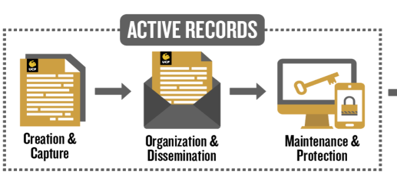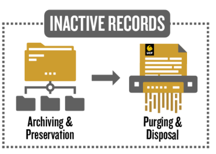Records Conservation and Storage
All UCF records must be conserved/maintained and stored for minimum retention periods as determined by the Florida Department of State Division of Library and Information Services. Please review the Records Retention Schedules section for the retention periods by record categories.
This section defines the different types of active and inactive records, provides broad guidelines on how to store them within the required retention periods, and information on how to scan records.

Active Records
Active records are those records used regularly to conduct business. In other words, they have continuing administrative, fiscal, legal, or historical value that warrants storing them in an easily accessible location (e.g., keeping them in the office).

Inactive Records
Inactive records are documents that you no longer need regular access to but which are required to be kept to meet retention requirements (see Records Retention Schedules). Some documents may be kept beyond retention periods if needed for audit or litigation purposes.
Other Active and Inactive Records
Vital/Essential/Mission-critical Records
These are records that are necessary to conduct business under than other-than-normal conditions and to resume normal business after the event, which may include otherwise inactive records. For example, if your building were damaged and you had to re-locate, what would you need in order to continue your department’s work? How will you access it? How will you secure it?
If you have questions about creating a plan for your vital records, contact Security and Emergency Management. They coordinate the university’s Continuity of Operations Plan (COOP) and can provide guidance and suggestions.
Records with Historical and Archival Value
UCF Special Archives and Collections manages the preservation and storage of items and documents of historical value to the university. Please contact them to determine if your records should be sent to archives rather than being permanently destroyed after they have passed the mandatory retention period.
Records Storage and Safety Guidelines
This section provides broad guidelines on how to store records that are still within the required retention periods and information on how to scan records.
Guidelines for Storing Active Physical Records (Hard Copies or Original Documents)
- Records must be stored away from windows
- Records must be on anchored, flame-retardant metal shelving with the bottom shelf 3-6 inches from the floor.
- All physical storage, including file cabinets, file storage boxes, disks/DVDs/Microfilm boxes, and other storage of records should be clearly labeled with the contents (record series title(s)), inclusive dates, and earliest date of destruction if applicable. State of Florida Recommended File Label.
- No food, beverages, or potted plants permitted in the room / facility.
- No smoking in the room /facility.
- Climate control should keep relative humidity between 40 and 50% and temperature between 65 and 70 degrees.
- Lighting in the stack area should be a maximum of 19-46 foot candles or 2–500 lux.
- The facility should be close enough to your operations to be retrieved efficiently.
- It must be a secure area with controlled access for protection of private and confidential documents and information.
- Florida Department of Library Services information on a proper Public Records Center facility
Security for Physical Storage
The UCF Police can conduct a security review of your storage area. Contact 407-823-5555 for more information.
Guidelines for Electronic/Cloud Storage
Electronic records include Word Documents and other document formats, databases, emails, digital photographs and audio, scanned copies of paper or microfilm documents.
- Use a consistent file naming convention for electronic storage which is easy to understand, consistent, ensures universal retrieval, and considers the relationship to the paper records.
- The system cannot impair the right of the public to inspect or copy records and must allow compliance with retention schedule sand disposition requirements.
- Security must allow for only authorized users to have access, incorporate integrity checking methods, and include backup and recovery procedures.
- Use a system of quality assurance that includes annual sample checks for data integrity and loss prevention and a test of ALL records for permanent errors at least once every 10 years (every 5 years is recommended).
- Actively convert records to new hardware/software used by the university as needed. (Do you still have records stored on floppy disks?)
Refer to Florida Administrative Code Rule 1B-26.003 for more electronic record-keeping information.
Security for Digital Storage
In accordance with UCF’s Information Security Office (InfoSec), all file servers have the capability to assign appropriate security permissions to users for accessing folders. This is an acceptable practice.
For additional security, depending on the type of data involved (required for Highly Restricted Data per policy 4-008), users may choose to encrypt files in the file server folders. This may be done at the file level using programs such as MS Word, Excel, PDF, etc.
Scanning Stored Documents
(Retrospective Conversion Project)
- A retrospective conversion project is the bulk digitizing of existing back files. This process requires an approved Records Disposition Request Form and Scanning and Microfilming Request Form before disposing of paper copies.
Note: Documents scanned as part of the regular business process/workflow do not require a Records Disposition Form. - The digital copy of a record can count as the document of record (the primary document) and the paper copies do not need to be retained.
- Quality checking each scanned document must be part of the scanning processes.
